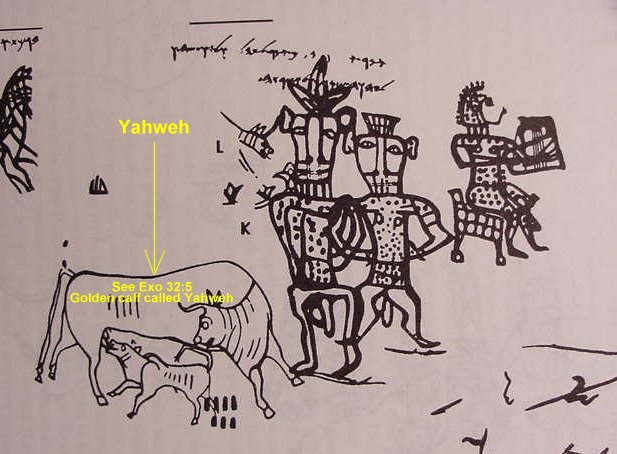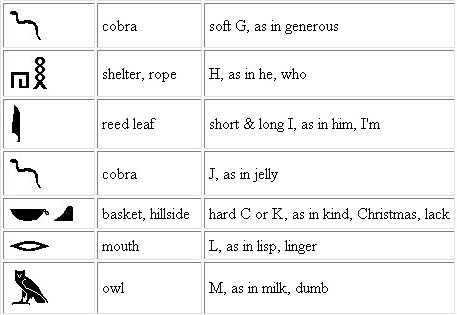Yah-Weh of Samaria & His Asherah

"Kuntillet`Ajrud, Sinai Caravansarai, ca. first half of 8th centry BC. Drawing of Yah-Weh of Samaria and his Asherah on a pottery shard (Pithos A). Inscription in Hebrew reads:
"Thus says...Say to Yehalle[lel], Yo`asa and...I bless you (herewith- or: have blessed you) to/before Yah-Weh of Samaria and his asherah."
Note the portion of bridled horse to the left of the figures (pp.225-6, "Baal, El, Yah-Weh, and 'His Asherah'," Othmar Keel and Christoph Uehlinger. Gods, Goddesses, and Images of God in Ancient Israel. Minneapolis. Fortress Press. 1998. ISBN 0-8006-2789-X ).
There were many Yah gods throughout the lands of Egypt, Canaan, and Assyria. Yah is associated with the moon god in Egypt, with the heifer/cow gods of Jeroboam, and with goat gods. One thing is certain, the real God of Israel was not Yah or Yah-Weh as we are led to believe.
Special note here:
Notice the name "Yehalle[lel]." It begins with "Yeh" which is the same as "Ieh and Jeh" as prefixes to many Old Testament Bible names. Whence did this three-lettered prefix come from? "Yeh" is a contraction of "Ehyeh" the name given to Moses at the burning bush. At the burning bush, when Moses ask God for his name, God told him to tell the Israelites "Ehyeh asher Ehyeh" sent him unto them. The sacred name of deliverance was "Ehyeh". The word "asher" is said to mean "happy." In later translations by the Jews, "Ehyeh" was considered the ineffable name (not to be spoken). In the place of this name they inserted the substitute "I-AM" which is said to be the future tense of the name "Ehyeh"; such as "I AM WHO I AM"; I WILL BE WHAT I WILL BE; etc. etc.: there being no end of the suggestions of the future tense. The problem here is that in ancient Hebrew there is no future tense verbs. This interpolation then had to occur when a language was adopted that had such future verbs such as Babylonian Aramaic adopted after 587BC.
We conclude that the correct ancient name of God was Ehyeh Or Ehjeh and not Yah-Weh!
We now turn our attention to this Yah-Weh. Was he the God of the Israelites or a Baal god brought in from somewhere else? The postsherd above that has the Yah-Weh and his Asherah heifer/cow, is from Samaria circa the 8th century BC. This was a time of extreme Baal worship in that region and the heifer/cow god (Asherah) set up, one in Dan and the other in Bethel (1Kings 12:28-33). This cow worship is associated with Isis and the sexual rituals of this religion include homosexuality and beastality. For Yah-Weh to have his own heifer/cow and demonstrate his Baal identity as shown on the postsherd, tells us this is not the God of Israel. The God of Isreal would not be imaged in the first place, this being forbidden, and certainly not drawn on potsherds with his thing dangling to show his prowess! There are only two other beings here, another man and a female playing a musical instrument. Neither of these are Yah-Weh's "Asherah." This leaves the heifer/cow as Yah-Weh's consort. Is it just coincident that down through the ages men have spoken of their wives as heifers and cows?
We must insist that EHYEH is the ancient name (of the invisible God) given to Moses and the false Baal god Yah-Weh (images and figures made of him) was adopted by the Israelites soon after coming over into Canaan land. This Baal worship has been a pain and a problem for the Israelites from the time they entered into the land of promise. They were warned not to adopt these gods, their worship and rituals, and not to intermarry with these heathens. But the Old Testament reveals they went after Baal (Yah-Weh) and the sexual rituals associated therewith, with such enthuasim, the nation was finally morally destroyed and God evicted them to Babylon as punishment.
The True Elohim is Ehyeh! You may change the "y" into a "J" for it ancient times the "y and i" had also the "J" sound. The rule of ancient grammar, is that when the letter "i" is followed by a consonant it has the "i" sound. When it is followed by a vowel it has the "J" sound.
Did not the letter "J" get invented just 500 years ago? Yes, the letter "figure" was invented about 500 years ago. But do not take that half-truth and go wild like other idiots.
From what letter did the "J" figure derive when it was developed? It was developed from the letter "I".
Now is that a coincidence or is it the evidence that the letter "I" contained both the "I" sound and the "J" sound and a distinction when the "I" was used as a "J" sound needed to be identified?
So what did they do? They took the letter "I" and put a small tail on the bottom and curved it to the left forming the "J" letter. Now, when the sound of the "J" was to be identified it had its own alphabet character.
Here is the simple historical fact: the letter "J" sound has always existed, even back to the time of the Egyptian hieroglyphics.

What was not in existence in the genealogy of Paleo-Hebrew and the Semitic languages was a letter character to identify the sound. The "J' sound existed many millenial before the letter character was finally attributed to the sound. When this was done, the letter "I" no longer was used to represent both the "I" sound and the "J" sound. So, if any idiot tells you the "J" sound did not exist until 500 years ago when the letter "J" was created from the letter "I", just consider his/her ignorance and walk away. Because what follows after this lie is beleived, IS AN ATTACK AGAINST THE NAME OF JESUS!
What do they want to replace the sacred name of Jesus with? It is "Yah-Weh" or "Yahshua" or some other "Yah" Baal god name to take you away from the God of salvation and deliverance.
In the name of Jesus there is salvation (Hebrew salvation is "Yesha" add (s) for syntax and you have "Yesha(s)". Since there is no "Y" in ancient Paleo-Hebrew and it is written as an "I" we can see since it is followed by a vowel it has the "J" sound. Therefore, Yesha(s) is in fact pronounced "JESHAS." Now pronounce that and then JESUS and see there is really no differance). In the names "Yah-Weh and Yahshua" in Hebrew there is no salvation, the names do not even contain the root of salvation!
Yah-Weh of Samaria and other such findings of the tetragrammaton YHWH or its variations, are always associated with the profane, the unholy, and the abominable. Do not be deceived: Jesus is the only saving name (Acts 4:12).